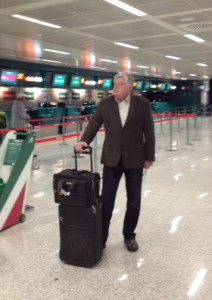I just conducted a Skype evaluation with a parent who has a developmentally delayed, ASD (Autism Spectrum Disorder) child from our Beijing chapter, one of NACD’s international hubs. This mom made a remark that I have heard probably thousands of times through the years, but realizing that the issue she brought up is international and not just a US issue has compelled me to comment.
This mother of a three-year-old who cannot not dress or undress himself, one of the foundational representations of independence and fine motor skills, commented that she was concerned her child may have a fine motor problem, not because her child couldn’t remove his sock, but because the preschool he attended was waving a red flag since this little three-year-old was not yet cutting with scissors. Really!
I have long wanted to ban scissors from preschools, but if we were to do that what would they do all day? Children can only eat so much paste. What criteria could they use for success, what would they use to validate their existence?
In the interest of full disclosure, I will admit that I am a bit biased on this subject. In 1951 I flunked cutting with scissors. Yes, I confess I flunked. It was my first and actually not my last academic disaster. I was shamed and humiliated. I never should have flunked cutting with scissors even though I was five, I really shouldn’t have been encouraged to use scissors. But beyond that, there was actually a reason why I flunked cutting with scissors. I was left-handed and back then they didn’t make left-handed or uni-hand scissors—which don’t really work with either hand.
Cutting with scissors can actually be used as a metaphor for a number of issues with education, that being just because we/they have been using it forever doesn’t make it right, smart or neuro-developmentally correct.
I am genetically predisposed to be left-handed and left-sided and as with many of us lefties, we do not clearly demonstrate which is our dominant hand as early as right-sided children. From the get-go the world encourages us to use our right hand like the majority of the population. Back when I was starting school everyone wrote with their right hand. Right was right and left was wrong. Even though we lefties know that only left-sided people are in their right minds. In countries like China that is still the case—everyone is taught to write with the right hand.
Children typically do not strongly and conclusively demonstrate a dominant hand until they are globally, neuro-developmentally about a 5*. For children with a developmental issue, that point is often not reached until years later than their chronological peers. So, should we really be encouraging and pushing one-hand, dominant-hand activities like writing and cutting before we even know which hand the child should be using?
If children must go to preschool, how about teaching them how to actually start becoming independent. Dressing and undressing themselves might be a good start, making their bed, or even cleaning up after themselves. Montessori schools often do a good job of teaching children how to manage self-help skills and household tasks. But cutting with scissors? I can often go from Christmas to Christmas without ever touching a pair of scissors. Since when was cutting a four-year-old’s survival skill or foundational fine motor function? Perhaps its a four- or five-year-old rite of passage that they need to cut their hair just that one time to see how they look with that bald spot in front.
Ranking right up there with “cutting with scissors” is writing and we really shouldn’t just blame preschool and kindergarten teachers, we need to throw in some occupational therapists as well. Teachers and therapists—please stop trying to make little children develop one-hand dominant skills like writing and cutting before they are neuro-developmentally ready. Not until most children are neuro-developmentally about a 5* can we accurately and safely determine which is their dominant hand. Prior to that time, they can swing back and forth. Besides, what is the rush? You are often not only teaching a child a one-handed skill and pushing them toward that hand, but you are probably doing it before their working memory, attention and motor planning are up to the task. The result being that you are only succeeding in teaching them that they can’t do it properly. Congratulations, they have learned to hate it! Our NACD cardinal rule of education is that step number one is teaching the child to love whatever it is you are trying to teach. Failure doesn’t teach them to love writing or cutting with scissors.
So much of education is based on perpetuating a list of things to teach children in different grades, regardless of whether or not it is meaningful, relevant, neuro-developmentally appropriate or if anyone really expects the student to understand, assimilate or remember it. We often take little children who prior to beginning their “education” love learning anything and spend the next twelve or more years teaching them to hate learning anything—brilliant!
Part of this tragedy is that there is so much that could be and should be done with all children, not the least of which is building a neuro-developmental foundation that actually gives them access to their innate intelligence and really affects not only their education, but their ability to learn, think and communicate—their futures. It’s the 21st Century and it’s about time that the educational system understood that children have these things they carry around between their ears that we call brains and that we have the ability to develop them all, not just try to push things into them. We can build a foundation of auditory and visual processing, short-term memory, working memory, executive function, visualization, and conceptualization and overall neurological efficiency. I would love to see our classrooms and schools receive report cards based on how well they are creating children’s foundations for learning, turning children onto learning and actually educating them. And please, let’s stop making a big deal about little children cutting with scissors.
– Bob Doman
*We will generally acknowledge a child as being neuro-developmentally 5 when they have short-term and working memory that is commensurate with where we like to see five-year-olds. Specifically having short-term memory (auditory and visual digit spans of 5) and working memory (reverse auditory and visual digit spans of 4). Working memory is the foundation of executive function and determines complexity of thought and relates to global maturity.
Related Blog Articles:
To learn more about how you can work on you or your child’s short-term and working memory, check out the following links:
The Simply Smarter System (Windows/Mac)



 Thanksgiving is the one day a year when we in the United States pause to come together as family and friends to give thanks for the blessings of the preceding year and to reunite.
Thanksgiving is the one day a year when we in the United States pause to come together as family and friends to give thanks for the blessings of the preceding year and to reunite. Not really. I’m sitting in a very hot, very humid, very closed Charles de Gaulle airport. It has been one of those very wonderful travel days. (Up at 3 a.m. to get to the airport in Bucharest, get on a flight to Paris, sit on the very hot, very humid plane for three hours before they decide it’s broken and they can’t fix it, wait around until after 8 p.m. to catch another flight. My connection left many hours ago. Eventually I will get on a plane to Salt Lake City, which I think is about another 12 hours or something. Oh, the joys of international travel. And let’s not talk about the endless lines, or if there is not a narrow corridor, generally masses of people converging on a target location.
Not really. I’m sitting in a very hot, very humid, very closed Charles de Gaulle airport. It has been one of those very wonderful travel days. (Up at 3 a.m. to get to the airport in Bucharest, get on a flight to Paris, sit on the very hot, very humid plane for three hours before they decide it’s broken and they can’t fix it, wait around until after 8 p.m. to catch another flight. My connection left many hours ago. Eventually I will get on a plane to Salt Lake City, which I think is about another 12 hours or something. Oh, the joys of international travel. And let’s not talk about the endless lines, or if there is not a narrow corridor, generally masses of people converging on a target location.